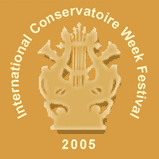
|
|||
 |
|||
 |
| CONCERT PROGRAM |
|
OCTOBER 5, WEDNESDAY FESTIVAL CEREMONIAL OPENING ALEXANDER GLAZUNOV ENTR’ACTE Performers: Igor BUTMAN, saxophone St. Petersburg Capella Symphony Orchestra, Video composition of A.K. Glazunov’s documents was prepared by the Conservatoire Scientific Library’s bibliographic department ALEXANDER GLAZUNOV Symphonies, ballets, romances, concert and theatrical music—all these, as if from the horn of plenty, were produced by the pen of the “miracle-hero”, as those in Rimsky-Korsakov’s circle fondly called Alexander Konstantinovich Glazunov. It is enough to recall the unfading “Raimonda”, the Fifth and Eighth Symphonies, the delightful musical embodiment of Pushkin’s Bacchanal song “What Hath Silenced the Joyful Voice”, or the Violin Concerto. A.K. Glazunov is rightly considered the crowning member of an entire epoch of Russian classical music, beginning with Glinka and continued by the “Mighty Handful” and the Belyaev circle. Glazunov created his own symphony type — a lyric-epic symphony that differed completely from the later tragic symphony of Tchaikovsky. In addition to all this he also stood at the head of the Conservatoire for over twenty years—ten of which came during the stormy post-revolutionary period. The zenith of Glazunov’s work as a composer is found in the first decade of the 1900s. After this his compositional energy weakens. The time period which Glaznov had represented was radically changing. It seemed as if Glazunov’s art remained in his era, all the more removed from us. Perhaps we are faced with this artistic aberration because the 20th Century — filled with its wars, diverse conflicts and catastrophies — has distanced us from an accurate perception of Glazunov’s music. The music itself, however, was not nor is it today under threat of being forgotten. The unprejudiced listener will recognize the development of Glazunov’s traditions in the work of Myaskovsky, Shostakovich, Stravinsky and — in our modern world, for example — Slonimsky. The music of Glazunov contains balance, harmony, majestic calm, epic scale, and the perfection of architectonics. These characteristics have always been and always will be attractive because they — outside of any concrete historical boundaries—possess values common to all mankind. We recall the words of author of the “Ninth Symphony of the 20th Century”—“The Rite of Spring”, rebel, and neoclassic I.F. Stravinsky, that he was spellbound “by the incredible mastery of this sage”, the 140th anniversary of whose birth the Saint Petersburg Conservatoire celebrates this year.
|


